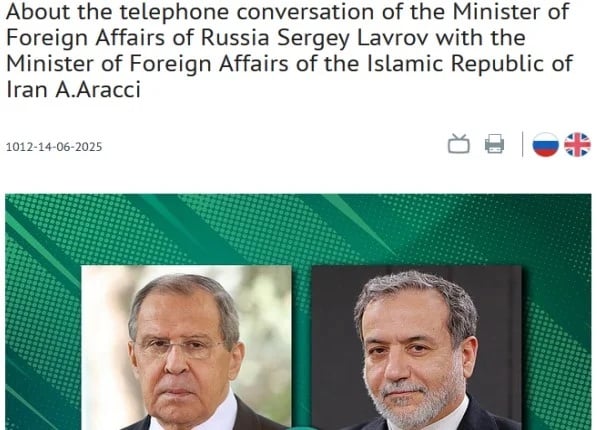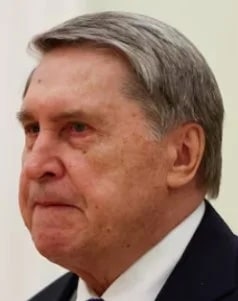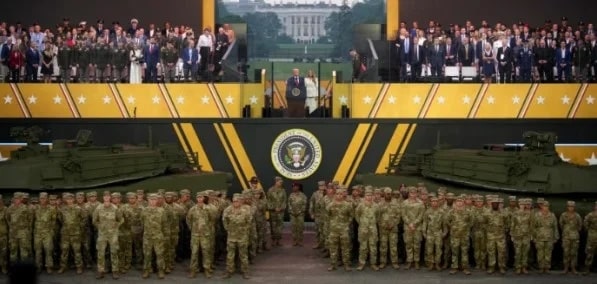That’s an expression which originated in the fly-blown goldrush mines of Australia in 1840 and then moved with the flies to the goldrush mines of California a few years later. Literally, it means a man who is too quick for a fly to settle on him. Metaphorically, it means a man who is much too clever to be fooled by a fraudster or deceived by an enemy.
Putin is much too quick not to recognize that President Donald Trump is both a fraudster and an enemy. Putin doesn’t have to be told by the General Staff that Trump’s war plans are an existential threat to Russia’s security on the western front (Ukraine, Romania, Poland); northern front (Norway, Sweden, Finland), eastern front (Japan, South Korea); and southern front (Iran).
Last Thursday night, as the U.S. and Israel began their war against Russia’s strategic ally Iran, starting with decapitation strikes against the Islamic Republic’s leadership, the Russian General Staff didn’t have to send Putin their “we told you so” message. But the Kremlin’s communication system broke down, nonetheless.
Officially, the war didn’t begin for the Russians until they detected U.S. and Israeli fuelling, arming, and deception preparations on Thursday ahead of the first Israeli weapons launches after midnight into Friday. Earlier in the day, Putin had been telling his arms chiefs “we know the enemy’s modus operandi. However, I do not think we are falling behind in any way.” The combination of drone and missile attack tactics of the enemy requires, he said,
the new state armament programme [to] ensure creation of a universal air defence system capable of operating under any conditions and effectively hitting air assault weapons regardless of their type.
What about defence against ultra close range, ultra low-altitude drone attacks of the kind which the U.S., the UK and Ukraine had successfully executed, evading detection and interception, on June 1 against Russia’s nuclear bomber bases across the country? Putin’s scripted phrase “air assault weapons” left that unmentioned in the Kremlin communiqué, but not in the closed-door session after Putin announced:
Let’s get to work.*
What then was the similar coordination by the U.S. and Israel of long-range air assault operations with ground-level attacks targeted fatally on five, possibly eight Iranian generals and five Iranian nuclear scientists. The U.S. and Israeli media reports have termed these decapitation strikes acts of war, not acts of terrorism. The Russian media reports have followed suit.
The state media platform RIA Novosti editorialized on June 14 that the Israeli operations are a rehearsal for what the U.S. and its allies are planning to do to Russia, and that this is well understood in Moscow.
Many respected analysts of different calibres believe that the purpose of the attack on Iran is to eliminate the country’s nuclear program (necessarily) and regime change (extremely desirable). In fact, the main goal of the operation is to work out a mass preventive disarming strike against the enemy with serious military capabilities—that enemy is called not Iran, but Russia.
This strategic plan, writes Boris Rozhin, a leading military blogger reflecting the views of senior Russian military officers, is President Donald Trump’s first of all, and aimed at Russia next.
Current events in the Middle East region demonstrate a dramatic change in the geopolitical situation. The Western powers, throwing away their purported enmity, have united in a general offensive against an independent Iran, a key ally of Russia… The previous ‘disagreements’ have turned out to be only a spectacle for the public. Iran’s defeat will be a strategic catastrophe for Russia, surpassing even the loss of Syria. Iran plays a key role in maintaining a balance of power in the Middle East and is Russia’s most important ally in confronting Western domination… The war against Iran, initiated by the Western world, could have disastrous consequences for the entire world order. This is not a local conflict, but an attempt to finally break the last pockets of resistance to the unipolar world…For Russia, this means the need to make drastic decisions to protect its strategic interests and allies. — June 14, 21:19
“In summing up this story,” Rozhin wrote yesterday, — June 14, 14:31,
we can conclude—if there is anyone who has not yet understood—that the ‘Trump peace attempts’ are worthless and will lead to nothing—neither in the Middle East nor in Ukraine. Therefore, agreements with Trump are not worth it. It is necessary to strengthen the army and the military-industrial complex and achieve the goals of the SVO [Special Military Operation] by military means. In order not to say again, ‘we wanted peace, and the Americans deceived us again’, as the Iranians do now.
In the policy discussion currently under way, a Moscow source reports the intelligence assessment that Iran’s military capabilities are not as effective as they have been publicly portrayed or as the generals have threatened; that the clerical leadership under Ayatollah Ali Khamenei knows this; and that he and his clerical allies believe their best chance of survival in power is to limit the counterattack on Israel, ask for a ceasefire, bargain with their threat to close the Hormuz Strait, and abandon their negotiating positions on nuclear enrichment and missile development.
“If the nuclear bomb was a bluff, and we believe it was,” the source says,
then they should have learned the lessons of Saddam [Hussein]. They should have expected Netanyahu and Trump to call their bluff. Now that’s happened, Iran’s internal weakness is also stark. I believe SVR [foreign intelligence], GRU [military intelligence] and MiD [foreign ministry] have concluded the conflict is the Iranians to lose—and this is what is happening. What can Putin do if the clerics have no nerve to fight?
Follow the sequence of events as these messages went to the Kremlin for decision.
On Friday (June 13), according to his first acknowledgement at eight o’clock in the morning, the Kremlin spokesman said: “President Putin is receiving real-time reports on regional events via the Ministry of Defense, the Foreign Intelligence Service [SVR], and the Ministry of Foreign Affairs.” He added there was “concern at the sharp escalation of tensions between Israel and Iran.” The spokesman also promised:
by order of the head of state, the Foreign Ministry will release a detailed statement in the very near future, which will then be distributed at the United Nations.
This was a delaying tactic because it took the Foreign Ministry four hours to agree with the Kremlin, the intelligence services, and the Defense Ministry on the wording to be issued. By the time they agreed on the draft, there were just 475 words.

Source: https://mid.ru/en/press_service/spokesman/official_statement/2025920/
After condemning “the Israeli leadership”—as if the operation is not supported by the overwhelming majority of the Israeli population—the Ministry statement focused its attack on the International Atomic Energy Agency (IAEA) because it “has a great responsibility in this difficult situation.” U.S. involvement in the operation, and in the strategy of regime change in Iran—reported by the intelligence agencies—was ignored. Instead,
we remind in this regard about the readiness of the United States to hold another round of negotiations with Iran on the Iranian nuclear program in Oman.
In this line, the Foreign Ministry was trying to signal that Putin wants Washington and Teheran to believe he can be on both sides at once although Putin has been told by his advisors that right now neither side believes him; and that Washington doesn’t care.
Not a single word of assistance to Iran or “cooperation”—the key word in the Treaty of January 21, 2025 — appears in the document Lavrov produced for Putin to authorize. For the Iranians, this was an unmistakeable signal.
The disagreement between Putin, the Foreign Ministry and the General Staff and Defense Ministry was an obvious one, and a big one, too. They were bound to Iran by the strategic agreement Putin had signed with Masoud Pezeshkian, the Iranian President, on January 21. The pact did not require Russia to join Iran militarily in the new war, but Article 4 did say that in facing “common threats…[1.] the intelligence and security agencies of the Contracting Parties shall exchange information and experience and increase the level of their cooperation. 2. The intelligence and security agencies of the Contracting Parties shall cooperate within the framework of separate agreements.”
Had the Russians done everything to assist the Iranians operate their long-range detection and missile defences against the Israeli attack from the air? What role have the Russians played in the guidance of the Iranian drone and missile counterattack? Are there recriminations from the Iranians that the Russians had known more than they disclosed; done too little; delayed their intelligence sharing when speed was required?
Then there was Article 3(3) of the Putin-Pezeshkian treaty:
In the event that either Contracting Party is subject to aggression, the other Contracting Party shall not provide any military or other assistance to the aggressor which would contribute to the continued aggression, and shall help to ensure that the differences that have arisen are settled on the basis of the United Nations Charter and other applicable rules of international law.
Since the fall of President Bashar al-Assad last December and the partition of Syria by Turkey, Israel and the U.S., the Iranian leadership have hinted at their belief that Putin is making a secret deal with Trump for the settlement of the Ukraine war, and would abandon Teheran as he had abandoned Damascus.
The treaty was in English as one of its three official languages, so U.S. officials can read it. Secretary of State Marco Rubio has encouraged the Iranians as their suspicions mounted. On June 12, Rubio had sent Moscow a Happy Russia Day message—the first from Washington in many years. He was fuelling Iranian suspicions. “On behalf of the American people, I want to congratulate the Russian people on Russia Day,” Rubio wrote.
The United States remains committed to supporting the Russian people as they continue to build on their aspirations for a brighter future.

Source: https://www.state.gov/releases/office-of-the-spokesperson/2025/06/russia-national-day/
Rubio’s benevolence squeezed his brief message to Russia between longer and warmer messages for the Philippines on its Independence Day and Britain’s King Charles III on his official birthday.
The next Russian move was Putin’s to make to allay the Iranian suspicions and reassure Pezeshkian there was no Russian betrayal of the treaty.
Putin telephoned Pezeshkian on Friday afternoon, but Putin also decided to accept a telephone call from Israeli Prime Minister Benjamin Netanyahu at almost the same time. Why take the Netanyahu telephone call then, since the Foreign Ministry claimed to be categorically clear that Netanyahu was to blame for the attack on Iran? Netanyahu’s office has claimed Putin came fifth or sixth on Netanyahu’s call log—after President Trump, German Chancellor Merz, French President Macron, Indian Prime Minister Modi, and British Prime Minister Starmer. What was Putin’s hurry to keep his place in that line?
For the first time in Kremlin history, the President ordered the news of the Pezeshkian and Netanyahu calls, two very different communications, to be reported in a single communiqué. In five paragraphs and 210 words, Putin treated his strategic treaty partner Iran equally with his partner’s enemy Israel. Forty-eight of Putin’s words condemned Israel’s attack and expressed condolences to the Iranians. Fifty-one of Putin’s words were addressed to Netanyahu with Putin’s offer of “mediation so as to prevent further escalation” and of “continu[ation] to promote a de-escalation between Iran and Israel.”

Source: http://en.kremlin.ru/events/president/news/77181
Russian and other sources confirm this communiqué has astonished Russia’s allies.
When Iranian Foreign Minister Abbas Araghchi telephoned Lavrov the next day to request clarification of what Putin had said and of how the President understands Articles 3 and 4 of their treaty now, Lavrov was unable to answer publicly. In the Foreign Ministry communiqué, there is no mention of the treaty and no mention of the war.

Source: https://mid.ru/ru/foreign_policy/news/2026234/
Instead, Lavrov said the telephone call was “in continuation of the telephone conversation held on June 13 by President of the Russian Federation Vladimir Putin with the President of the Islamic Republic of Iran M. Pezeshkian”. Lavrov repeated Russian condolences and readiness to “contribute to efforts to resolve the situation around the Iranian nuclear program, as well as the de-escalation of the conflict between Iran and Israel”. Lavrov gave as example, not the concrete “cooperation” which Putin had signed with Pezeshkian, but instead “discussion in the UN Security Council and the IAEA Board of Governors, as well as within the framework of the SCO and BRICS.”
A few minutes after Araghchi and Lavrov had hung up, and after Lavrov reported to Putin what had been said, Putin telephoned Trump. There is no official Kremlin communiqué.

Yury Ushakov
Instead, Putin’s assistant Yury Ushakov (right) posted what is titled “Commentary by Aide to President”. There had just been a 50-minute call, Ushakov said.
Of course, Vladimir Putin wished Donald Trump a happy birthday—the President of the United States turned 79 today. Both leaders have expressed satisfaction with the established personal relations that make it possible to communicate sincerely and in a businesslike mode, search for the resolution of pressing issues on the bilateral and international agendas regardless of how complicated such issues may be. Vladimir Putin also noted that the United States are celebrating Flag Day today and 250th anniversary of the U.S. Army. As in their previous conversation, both presidents noted their brotherhood in arms during the Second World War.
If Ushakov’s arithmetic is reliable, Putin and Trump spent as much time on Trump’s birthday and the flag and army celebration — as they did on the war in Iran or in the Ukraine. Putin did not ask Trump what role the U.S. is playing in support of Israel and whether Trump supports the regime change objective which the Israelis have announced.
Instead, according to Ushakov,”Trump also views the situation as very alarming admitting, however, the effectiveness of Israel’s strikes on its targets in Iran.” It is not known if Putin asked Trump to clarify what he meant by “effectiveness”. According to Ushakov,
the Russian and U.S. presidents, notwithstanding such a complicated situation, do not rule out a return to the negotiating track on Iran’s nuclear programme.
Trump summarized for himself what he and Putin had discussed. “He feels”, Trump tweeted,
as do I, this war in Israel-Iran should end, to which I explained, his war should also end.

Source: https://truthsocial.com/@realDonaldTrump/posts/114683261634430212
Again Trump answered himself, later in the afternoon (June 14) in his speech at the Army parade in Washington. “The U.S. Army has driven bayonets into the heart of sinister empires,” the President said,
crushed the ambitions of evil tyrants beneath. The threads of American tanks, it’s done so well, it’s done so much, and sent the devil himself flying into full retreat. Time and again, America’s enemies have learned that if you threaten the American people, our soldiers are coming for you. Your defeat will be certain, your demise will be final, and your downfall will be total and complete.

At centre of the parade reviewing stand, President Trump and his wife. The June 14 parade not only celebrates the adoption of the Stars and Stripes as the U.S. flag (1777 https://en.wikipedia.org/wiki/Flag_Day_(United_States), but also the 250th anniversary of the establishment of the U.S. Army (1775). https://en.wikipedia.org/wiki/U.S._Army_250th_Anniversary_Parade
Representing military views in Moscow, Rozhin reports the risk to Russia of “Iran’s defeat… Of particular importance is the fact that Russia and Iran are neighbours in the Caspian Sea. The loss of this ally means: Violation of the strategic balance in the Caspian region; strengthening Western influence in a critical area for Russia; threat to Russian interests in the energy sector…Iran’s defeat will lead to the collapse of the system of the regional allies of Russia; complete domination of the West in the region; isolation of Russia from key partners.” — June 14, 21:19.
[*] President Putin did mention the June 1 attack at the identically titled meeting he held with the same officials the day before. At that session Putin declared: “special attention must be paid to the nuclear triad, which has been and remains the guarantor of Russia’s sovereignty, playing a key role in maintaining the global balance of power.”

